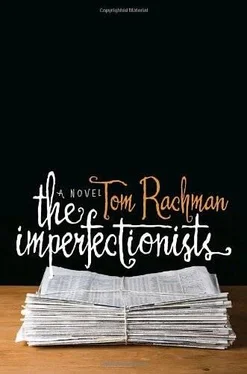She is hoping that a romantic couple will ask her to take their picture. She loves that-being, for a moment, admitted into their union. But no one asks. Two young Mexicans even prefer to take the photo themselves, the man extending his disposable Kodak before himself and his new wife. He counts down and, as he reaches zero, Ruby-who stands a distance behind them-sticks her hand into the background of their shot. The camera flashes, she drops her hand, no one is the wiser. When they get home, she'll be there forever.
When she reaches the newsroom, it is empty except for Menzies. She switches on her computer, not even bothering to disinfect her workspace. They will have fired her via email. And someone has stolen her chair. Typical. She scans the room. Does this guy ever leave?
"Oh, sorry," Menzies says, jumping up as she approaches. "I'm in your chair. Here, please. Someone took mine and I thought you weren't here today. I know that's a lame excuse. It is amazingly comfortable, by the way."
"You can request one if you want. Only took me about six years."
"Here." He pushes her chair over. "We both got stuck with the crappy shift, huh."
"What's your job today?"
"I'm actually running the show. Gulp. Get ready for a bumpy ride. Kathleen and Herman both have the day off, so it's just me. I'm sort of sweating bullets," he says. "Incidentally, I have something for you that's going to redeem me on the chair theft." He rummages through his backpack and pulls out a CD. "I've been lugging this back and forth to work for days now. Keep forgetting to give it to you. Remember we were talking that time about Tony Bennett versus Frank Sinatra? I think this may settle the matter. Live at the Sands. You will be converted to Frank."
"Hey, thanks. When do you need it back?"
"That's for you to keep."
She touches her chest with surprise.
"You have to tell me what you think of it," he says, talking fast, unnerved by her emotion. "Some of Sinatra's lead-ins to the songs are great. I think you're gonna love it."
"That is so thoughtful of you."
"It's just a copied CD, Rube! No big deal, seriously."
Awkwardly, she hugs him.
"No problem," he says, pulling away. "No problem. By the way, did you get that email I sent you?"
"What email? Is something the matter?"
"Not at all. It's about that headline on the nuclear-arms story. You did that head, right?"
"About how everyone's freaked out over Iran and North Korea? Did I fuck it up?"
"Not at all-your headline was great: 'Kooks with Nukes.' I suck at those one-column heads."
Clearly, he doesn't know they're firing her. He must be out of the loop.
She rolls her chair back to the copydesk and looks around the newsroom. Broken venetian blinds cover the newsroom windows, the strings tangled half up, half down, casting broken grids of shadow and sunlight across the grouchy old computers, their cooling fans grumbling away. Twenty years here. "My whole career."
Her computer takes forever to load up. "Come on." She is about to lose this job. "Thank God." Almost time to celebrate.
Her computer has stopped whirring; it's ready. She can picture the email. It'll say: "Ruby, please call me at home. It's about a very serious matter. Thank you." Who will have sent it? Kathleen? Or Herman? Or Accounts Payable?
Ruby logs on. All the routine emails are there: a festive edition of the Why? newsletter; something about turning off the lights in the bathrooms to save money; a reminder of how much it costs per minute to be late for deadline. But her dismissal?
She checks again.
Where the hell is it?
She keeps refreshing her in-box. She can't find it. It isn't there: no email. But there must be one.
No, there simply isn't.
She rises, sits back down, then stands once more and hurries into the ladies' room. She closes herself in a stall, sits on the toilet, covering her mouth.
Her breathing increases, her insides seem to swell. A tear runs down her face, slides ticklishly under her chin. Him-that's Dario's smell. The cologne from the night before. She never washed it off, and her tears have activated the scent.
She takes out her cellphone. Swallowing, wiping her nose, she brings up his number. She reads his name aloud. She dangles the phone between her thighs and lets it fall into the toilet. It splashes and bobs in the water.
She claps her hands once.
"I get to stay," she says.
She wipes her eyes. She can't stop smiling.
"I get to stay."
1975. OTT GROUP HEADQUARTERS, ATLANTA
Frantic calls poured in from the paper in Rome: yet another caretaker editor had quit and no one was in charge anymore. After years of neglect, Boyd had to take action.
His previous trip to the paper had been when he was still an undergraduate at Yale. Then, he'd stayed at a hotel in Rome because he lacked the stomach to visit his father's empty mansion. This time, Boyd was braver.
But from the moment he entered he fell into a dark mood. He snaked his finger along a picture frame, leaving a winding path in the dust. What are all these paintings for? A woman with a ridiculously long neck. Wine bottles and hats. A chicken in midair. A shipwreck. These things must have come with the place-Ott would never have wasted money on ornaments. Boyd called in the housekeepers and, not bothering to greet them, ordered that the mansion be scrubbed, top to bottom. "Also," he told them, "cover these paintings."
He opened the shutters. His father would have looked out from here, through the spiked fence, down the lonely lane. To think that Ott had acquired this spectacular house-not to mention the rest of the family fortune-from nothing. It was astonishing; it was humbling.
Boyd considered the living room, its soaring rococo ceiling, the worn Oriental rugs, the bookshelves, the old telephone on the wall. How grand it had been when his father marched across this room! Boyd could picture Ott striding over the carpets, up the stairs. Boyd always imagined his father like this-in perpetual motion. He could never conjure the man sitting still. Indeed, he had no sense of Ott simply living here, month after month, for years in the end.
Why had Ott stayed here so long? This place hadn't been his home. That had been in Atlanta. But buildings adjusted to Ott, not the other way around. He had deemed that the world needed the paper. So he damn well set about inventing it. He never sat still. That was how the great man had been.
Thinking of the paper's current state, Boyd went rigid with anger and shame. It was an affront to his father's memory, and Boyd himself was responsible.
The next morning, he met with all the section editors and asked them to hold tight-a new editor-in-chief was on the way. When Boyd returned to Atlanta, he employed a headhunting firm to poach a star from a top American newspaper. Someone young, bright, with spark. He got two out of three.
Milton Berber was hardly in the first bloom of youth. He'd already had a long journalistic career at a Washington paper, starting after military service in World War II. He'd reported on district court, got a break covering the State Department, became deputy metro editor, then deputy national editor, then deputy assistant managing editor. But by 1975 he had to admit it: he wasn't going any higher.
This annoyed him, since he believed he'd make a fine boss. But no one had ever given him a chance, not when he was driving a jeep around Naples for the U.S. Army, nor as an editor in Washington. True, it was not exactly a dream come true to work at a second-tier international newspaper. But at least he'd be running the place.
Boyd flew out to Rome with Milton to introduce the man around. After meeting the downtrodden staff and grasping the paper's mood, Milton had doubts. But Boyd-not the most charming man, perhaps-did seem intent on turning the paper around. So Milton said yes.
Читать дальше












